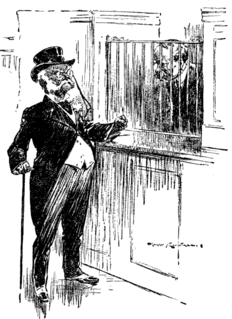Related Research Articles
A debit card is a plastic payment card that can be used instead of cash when making purchases. It is similar to a credit card, but unlike a credit card, the money is immediately transferred directly from the cardholder's bank account when performing any transaction.

Electronic funds transfer at point of sale is an electronic payment system involving electronic funds transfers based on the use of payment cards, such as debit or credit cards, at payment terminals located at points of sale. EFTPOS technology originated in the United States in 1981 and was adopted by other countries. In Australia and New Zealand, it is also the brand name of a specific system used for such payments; these systems are mainly country-specific and do not interconnect.
A commercial bank is a type of bank that provides services such as accepting deposits, making business loans, and offering basic investment products that is operated as a business for profit.
A transaction account, also called a checking account, chequing account, current account, demand deposit account, or share draft account at credit unions, is a deposit account held at a bank or other financial institution. It is available to the account owner "on demand" and is available for frequent and immediate access by the account owner or to others as the account owner may direct. Access may be in a variety of ways, such as cash withdrawals, use of debit cards, cheques (checks) and electronic transfer. In economic terms, the funds held in a transaction account are regarded as liquid funds. In accounting terms they are considered as cash.

Cheque clearing or bank clearance is the process of moving cash from the bank on which a cheque is drawn to the bank in which it was deposited, usually accompanied by the movement of the cheque to the paying bank, either in the traditional physical paper form or digitally under a cheque truncation system. This process is called the clearing cycle and normally results in a credit to the account at the bank of deposit, and an equivalent debit to the account at the bank on which it was drawn, with a corresponding adjustment of accounts of the banks themselves. If there are not enough funds in the account when the cheque arrived at the issuing bank, the cheque would be returned as a dishonoured cheque marked as non-sufficient funds.
Bank fraud is the use of potentially illegal means to obtain money, assets, or other property owned or held by a financial institution, or to obtain money from depositors by fraudulently posing as a bank or other financial institution. In many instances, bank fraud is a criminal offence. While the specific elements of particular banking fraud laws vary depending on jurisdictions, the term bank fraud applies to actions that employ a scheme or artifice, as opposed to bank robbery or theft. For this reason, bank fraud is sometimes considered a white-collar crime.
Cheque fraud, or check fraud, refers to a category of criminal acts that involve making the unlawful use of cheques in order to illegally acquire or borrow funds that do not exist within the account balance or account-holder's legal ownership. Most methods involve taking advantage of the float to draw out these funds. Specific kinds of cheque fraud include cheque kiting, where funds are deposited before the end of the float period to cover the fraud, and paper hanging, where the float offers the opportunity to write fraudulent cheques but the account is never replenished.
The Australian financial system consists of the arrangements covering the borrowing and lending of funds and the transfer of ownership of financial claims in Australia, comprising:

A cheque, or check, is a document that orders a bank to pay a specific amount of money from a person's account to the person in whose name the cheque has been issued. The person writing the cheque, known as the drawer, has a transaction banking account where their money is held. The drawer writes the various details including the monetary amount, date, and a payee on the cheque, and signs it, ordering their bank, known as the drawee, to pay that person or company the amount of money stated.
A Direct Debit or direct withdrawal is a financial transaction in which one person withdraws funds from another person's bank account. Formally, the person who directly draws the funds instructs his or her bank to collect an amount directly from another's bank account designated by the payer and pay those funds into a bank account designated by the payee. Before the payer's banker will allow the transaction to take place, the payer must have advised the bank that he or she has authorized the payee to directly draw the funds. It is also called pre-authorized debit (PAD) or pre-authorized payment (PAP). After the authorities are set up, the direct debit transactions are usually processed electronically.

An overdraft occurs when money is withdrawn from a bank account and the available balance goes below zero. In this situation the account is said to be "overdrawn". If there is a prior agreement with the account provider for an overdraft, and the amount overdrawn is within the authorized overdraft limit, then interest is normally charged at the agreed rate. If the negative balance exceeds the agreed terms, then additional fees may be charged and higher interest rates may apply.
Financial institutions duty (FID) was a duty levied by all Australian states and territories except Queensland on deposits to bank accounts, term deposits, and similar.
Australian Transaction Reports and Analysis Centre (AUSTRAC) is an Australian government financial intelligence agency set up to monitor financial transactions to identify money laundering, organised crime, tax evasion, welfare fraud and terrorism financing. AUSTRAC was established in 1989 under the Financial Transaction Reports Act 1988. It implements in Australia the recommendations of the Financial Action Task Force on Money Laundering (FATF), which Australia joined in 1990.

The Cheque and Credit Clearing Company Limited (C&CCC) is a UK membership-based industry body whose 11 members are the UK clearing banks. The company has managed the cheque clearing system in England and Wales since 1985, in all of Great Britain since 1996 when it took over responsibility for managing the Scottish cheque clearing as well, and in the whole of the United Kingdom since the introduction of the Image Clearing System in 2019.
Tax on cash withdrawal is a form of advance taxation and is a strategy to keep tax evasion in check. This mode of tax collection is also called the presumptive tax regime. Globally, 3 countries are known to consider this approach namely, Pakistan, India and Greece.
ATM usage fees are the fees that many banks and interbank networks charge for the use of their automated teller machines (ATMs). In some cases, these fees are assessed solely for non-members of the bank; in other cases, they apply to all users.

A bank is a financial institution that accepts deposits and recurring accounts from the people and creates a demand deposit. Lending activities can be performed either directly or indirectly through capital markets.
A deposit account is a bank account maintained by a financial institution in which a customer can deposit and withdraw money. Deposit accounts can be savings accounts, current accounts or any of several other types of accounts explained below.
A bank transaction tax is a tax levied on debit entries on bank accounts. In 1989, at the Buenos Aires meetings of the International Institute of Public Finance, University of Wisconsin–Madison Professor of Economics Edgar L. Feige proposed extending the tax reform ideas of John Maynard Keynes, James Tobin and Lawrence Summers, to their logical conclusion, namely to tax all transactions. Feige's Automated Payment Transaction tax proposed taxing the broadest possible tax base at the lowest possible tax rate. Since all transactions must ultimately be paid for by a final means of payment, namely via a transfer from a bank account or by settlement with currency, Feige proposed collecting his tax by levying the tax automatically on the debit and credit entries to bank accounts, thereby splitting the tax between the buyer and seller of every transaction. The APT tax is a uniform flat-rate tax on all transactions, assessed and collected automatically whenever there is a debit or credit entry to a bank account. As such, it is can be viewed as a bank transaction tax. Since financial transactions account for the greatest component of the APT tax base, and since all financial transactions are taxed, the proposal eliminates substitution possibilities for evasion and avoidance. The goal of the APT tax is to significantly improve economic efficiency, enhance stability in financial markets, and reduce to a minimum the costs of tax administration. The Automated Payment Transaction tax proposal was presented to the President's Advisory Panel on Federal Tax Reform in 2005. It can be automatically collected by a central counterparty in the clearing or settlement process.

United Dominions Trust Ltd v Kirkwood [1966] 2 QB 431 was a decision of the Court of Appeal relating to what constitutes "banking business" as a matter of English law.
References
- Bank Account Transaction Taxes: 'FID' and 'BAD' , David Kehl, Parliament of Australia Parliamentary Library Research Note 7 2001–02
- Press release on FID abolition, by the Australian Bankers' Association
- Bank account overcharging announcement, National Australia Bank media release and ASX announcement